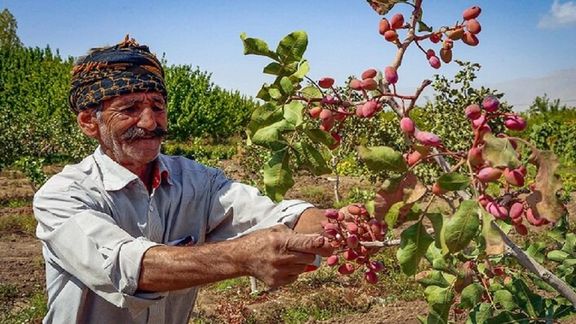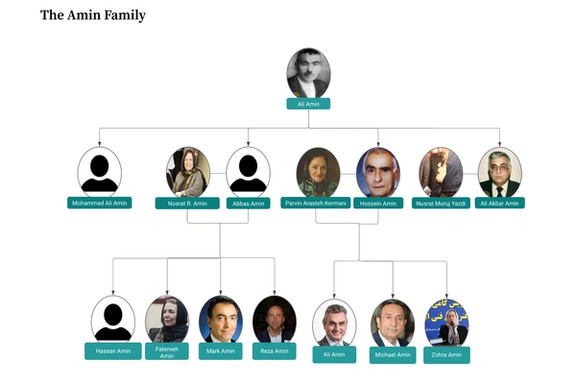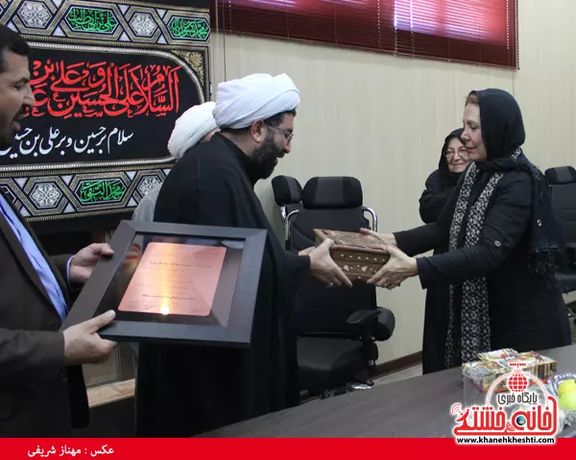A Pistachio Family Business In US Boosts The Iranian Regime

A recent report by Middle East Forum (MEF) delves into Amin family's US pistachio business, uncovering its role in advancing Islamic Republic's agenda.

A recent report by Middle East Forum (MEF) delves into Amin family's US pistachio business, uncovering its role in advancing Islamic Republic's agenda.
The shocking six-month investigation of the Philadelphia-based MEF revealed “The Amin family’s activities in Iran… have involved collaboration with Iranian institutions sanctioned by the US government or which are linked to violent regime entities, such as the Iran’s Islamic Revolutionary Guard Corps (IRGC), a designated terrorist group under United States law.”
MEF sounded the national security alarm bells, urging that the US Department of the Treasury’s Office of Foreign Assets Control (OFAC) and Department of Justice’s Foreign Agents Registration Act (FARA) unit launch investigations into Amin’s questionable business practices and the family’s alleged pro-Iran regime network.
The origin of the Amin’s family pistachio empire started with Ali Akbar Amin who moved to the US in 1952. According to the MEF investigation, “Around 2002, he established the Anar branch of Iran’s Azad University, which analysts today consider an important component of Tehran’s ‘soft power’ efforts. University faculty members stand accused of working on the regime’s nuclear and missile programs.”
The Amin family’s charities-- Maximum Difference and the Amin Foundation—have also pumped significant funds into the National Iranian American Council (NIAC)—an American-based organization widely viewed by many Iranians as a lobby entity for the Islamic Republic, although NIAC says it is a non-profit and non-partisan advocacy organization.

According to MEF, “Since 2015, for instance, both foundations have handed over $400,000 to the National Iranian American Council.”
The authors of the MEF investigation, Kara Hashemi and Sam Westrop, listed a lengthy bill of particulars against the Amin family business dealings with sanctioned Iranian banks and IRGC entities.
According to MEF’s research, the pistachio giant Amin Padidar, founded and run by the Amin family, works with the US-sanctioned Iranian conglomerate Bonyad Mostazafan. The Iranian multi-billion company Mostazafan, according to the US government, is controlled by Supreme Leader Ali Khamenei and the IRGC.
The US Department of Treasury sanctioned Iran’s Bank Sina, which is “Bonyad Mostazafan’s holding company in the investment and financial services industry, “according to the US government.
The EU classified Bank Sina in a list of “Persons and entities involved in nuclear or ballistic missile activities and persons and entities providing support to the Government of Iran.”
The brother of former Iranian president Akbar Hashemi Rafsanjani, whose family comes from the Kerman province, where pistachios are cultivated, referred to the Amin family as his blood relations. Rafsanjani was born into a family of opulent pistachio farmers. The Amin family hails from Rafsanjan in Kerman.

Amin family members live both in California and in Iran. The Amins are one of the giant pistachio producers in the US.
The MEF report said, “Amin Padidar’s parent company, Golrang, is closely involved with the regime and its paramilitary force, the Islamic Revolutionary Guards Corps.”
An additional startling finding of the MEF report is Amin Padidar, collaborates through a trade group known as the Iran Pistachio Association (IPA).
According to the MEF report, “The IRGC-linked company Arian Milan is listed as a financial sponsor of the IPA, alongside Sirjan Bonyad, the primary pistachio subsidiary of the regime’s Bonyad Mostazafan. The Sirjan Bonyad website states that the organization serves to ‘[implement] the policies of Mostazafan Foundation of the Islamic Revolution.’”
In addition to financing NIAC, the Amin family had donated to who’s who of largely pro-Iran regime NGOs in the United States.
MEF wrote, “In 2019 and 2020, the Amin Foundation appeared to split the $50,000 it had given NIAC in previous years, instead now giving $25,000 each year to both NIAC and Quincy. In total, Quincy has received $75,000 from Mark and Reza Amin’s foundation.”
The former NIAC head, Trita Parsi, is a co-founder of the Quincy Institute. In 2012, US District Court for the District of Columbia determined Parsi’s work was “not inconsistent with the idea that he was first and foremost an advocate for the regime.”
MEF revealed that “The Amin Foundation has also given thousands to the Ploughshares Fund, a left-leaning grant-making foundation that Hassan Dai writes has ‘financially supported groups and individuals who advocate for a friendlier policy with Iran and the lifting of economic sanctions.’”
Ploughshares has worked tirelessly to promote the Obama administration’s nuclear deal with Iran and has funded accused regime apologists such as Iran’s former ambassador to Germany, Seyed Hossein Mousavian, who was accused of complicity in Iran’s killing of four Iranian dissidents in Germany in 1992 in Berlin, noted the MEF report.
Iran International previously reported that Mousavian, who teaches at Princeton University, was under fire for bragging about the Iranian regime’s revenge for the US assassination of the US and EU-designated IRGC’s Qassem Soleimani, who coordinated militant groups throughout the region to attack Israel and US interests.
Amin family members have also faced criminal proceeding, including a conviction for illicit transport of $17 million from Iran to the US.
In 2015, Ali Amin (who has the same name as his grandfather) “pleaded guilty to transporting $17 million illegally through unlicensed means from Iran to the United States, using family members and family businesses to effect the transfers. Other Amin family members, including Ali’s brother, as well as his cousins, Fatemeh Amin and her unnamed brothers, were also implicated in the prosecution’s case. Fatemeh was found guilty in a US District Court of having filed a false tax return.”
Fatemeh is a cousin of Ali Amin who is the son of Ali Akbar’s other brother, Hossein Amin, who died in the US in 2008.
Ali Amin’s brother, Michael Amin (also known as Mahmood Michael Amin) is the founder and CEO of Los Angeles-based Primex Worldwide. Primex is major owner of pistachio farms.
MEF also disclosed that ”In 2012, Michael Amin, Mark Amin, his brother Reza Amin, and several others settled with the US Securities and Exchange Commission (SEC) for nearly $2 million after the agency charged them with insider trading concerning a company named DuPont Fabros Technology.”
According to MEF, “Ideologically, several members of the family are openly radical. Michael Amin regularly posts a wide variety of extremist rhetoric on his social media, citing both far-Left and far-Right sources regularly. His posts include wildly anti-Semitic claims about Jewish genetics and alleged Jewish control over the media and the government.”
The Amin family declined to provide a comment to MEF before the publication of its report.